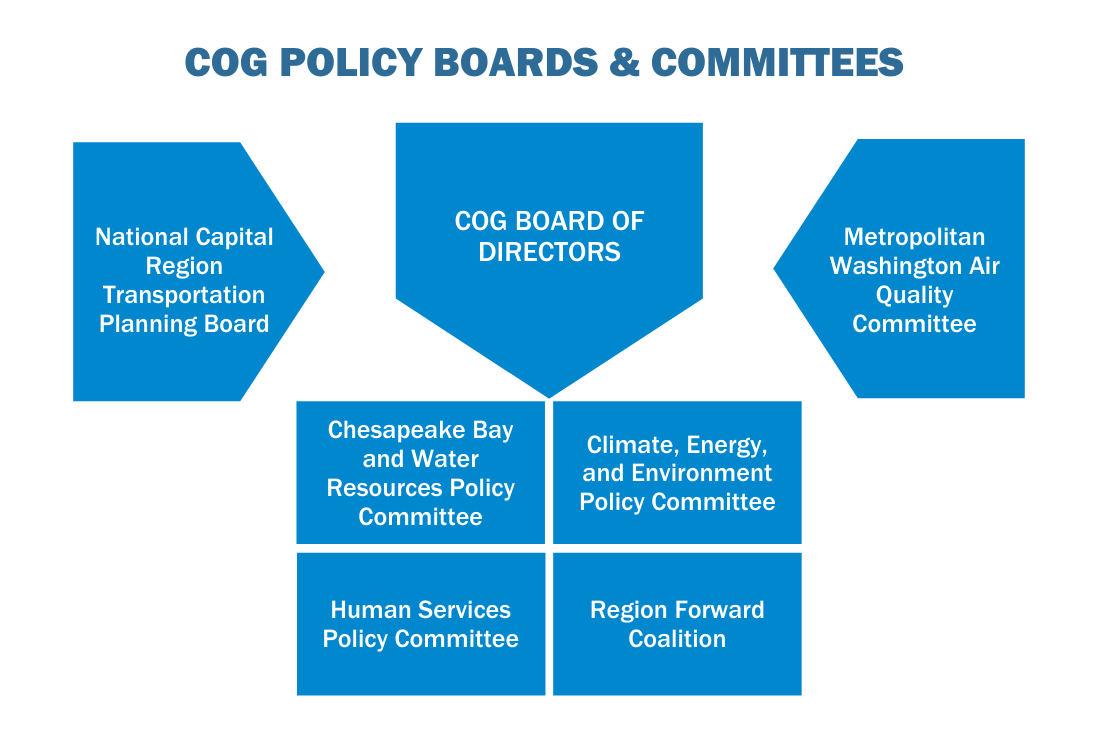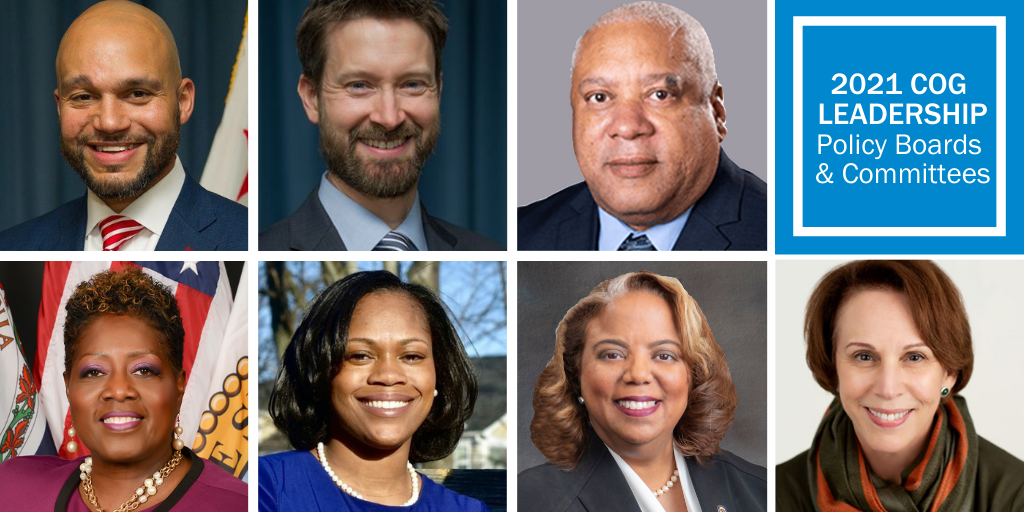At the start of the year, the Metropolitan Washington Council of Governments (COG) Board of Directors, under the leadership of Chair Robert C. White, Jr., endorsed several regional priorities, including continued collaboration to address COVID-19, improve security, and advance racial justice.

The COG Board’s policy committees as well as the independent policy boards that it partners with are supporting this work, while also tracking and advising on many legislative priorities, like transportation funding, air quality, water quality, climate and energy, human services, and more.
At the same time, committee members are weighing how their work together at COG can advance equity, which was adopted in 2020 as a fundamental value of the organization.
Learn more about the committees’ priorities and the officials leading the way:

COG Board Chair Robert C. White, Jr., TPB Chair Charles Allen, MWAQC Chair Robert Day, HSPC Chair Andrea Bailey, CBPC Chair Laurie-Anne Sayles, CEEPC Chair Deni Taveras, and RFC Chair Libby Garvey
National Capital Region Transportation Planning Board (TPB)
As the metropolitan planning organization (MPO) for the region, the TPB will complete much of the work to update its long-range transportation plan, Visualize 2045. It will also provide leadership and vision as the region begins its eventual recovery from COVID-19, especially from the disruptions to mobility caused by health safety measures. Looking ahead, the TPB will consider how to make the transportation system more resilient, especially to the impacts of climate change, but also more sustainable by reducing congestion and improving air quality. Underpinning all this work is the board’s dedication to more fully integrating equity, diversity, and inclusivity into its planning activities.
"We can’t solve regional challenges without working together as neighbors,” said Charles Allen, TPB Chair and District of Columbia Councilmember. “I look forward to plan for an economic recovery and transportation future that ensures equitable access to affordable, sustainable transportation options.”
Metropolitan Washington Air Quality Committee (MWAQC)
MWAQC coordinates regional air quality planning activities and is focused on working with members to identify and implement local initiatives to reduce air pollution. It tracks the region’s progress toward attaining National Ambient Air Quality Standards (NAAQS). Tremendous air quality progress has been made thanks to federal, state, and local government action, but the region has more work to do to meet the health standard related to ozone pollution. This year, MWAQC is working on a State Implementation Plan to meet the standard while involving the public in actions they can take to reduce emissions and improve air quality.
“We’ve done incredible work with local, regional, and federal partners over the past decade to address major air pollutants, but our work is not finished,” said Robert Day, MWAQC Chair and City of College Park Councilmember. “We must continue to prioritize this work with each other and our communities to meet our air quality goals and protect public health.”
Chesapeake Bay and Water Resources Policy Committee (CBPC)
The CBPC works continuously together to improve water quality in regional water sources, the Potomac and Anacostia Rivers, and the Chesapeake Bay, and in 2021 is adding a focus on winter salts—urging smart salt use among residents—and stream restoration to this coordination. The committee is also prioritizing climate resiliency in the Bay watershed by tracking and supporting legislation, monitoring and assessing the impacts of climate change, including precipitation data, supporting stormwater resiliency efforts, and coordinating with COG’s Climate, Energy, and Environment Policy Committee members on local climate actions.
“As CBPC members work together to ensure the health of one of our most essential resources—our water—we’re also taking a critical look at how and whether our actions are advancing diversity, equity, justice, and inclusion in the watershed and in the restoration efforts,” said Laurie-Anne Sayles, CBPC Chair and City of Gaithersburg Councilmember.
Climate, Energy, and Environment Policy Committee (CEEPC)
As the board’s principal advisor on climate change, CEEPC developed the 2030 Climate and Energy Action Plan to align with the climate goals approved by the COG Board last fall. In 2021, CEEPC will focus on guiding its local government members as they implement some of the climate actions outlined in the plan. CEEPC will discuss policy pathways to advance deployment of zero emission vehicles, zero energy buildings, and community choice aggregation, where local governments procure clean energy on behalf of its residents, businesses, and government accounts.
“The region has earned global recognition for its work on climate thanks to the dedication of CEEPC and other area leaders, but we must act urgently at the local level—and with equity top of mind—to meet our regional climate goals and avoid the most severe climate impacts, said Deni Taveras, CEEPC Chair and Prince George’s County Council Member.
Human Services Policy Committee (HSPC)
In 2020, the HSPC developed a regional homelessness compact, which was endorsed by the COG Board. In 2021, the HSPC will focus on a related challenge—mental and behavioral health in the region. This focus is especially important, as COVID-19 continues to disrupt the lives of area residents. Specifically, the group will explore what is possible for increasing resources and developing policy solutions where mental and behavioral health intersect the areas of child welfare, homelessness, and substance abuse. This work joins many other health and human services challenges addressed by the committee—including foster care, aging, housing, and more.
“The members of this committee are really invested in the process, and I look forward to working with them to find solutions and make a difference in our region,” said Andrea Bailey, COG Human Services Policy Committee Chair and Prince William County Supervisor. “We know that mental and behavioral health have wide-ranging impacts in our communities, and we want to make sure resources, policies, and programs are in place to support all residents, especially as we start to envision our region’s COVID-19 recovery and possibilities for the future.”
Region Forward Coalition (RFC)
COG's RFC oversees the region’s progress toward its shared goals in the areas of prosperity, accessibility, livability, and sustainability, recommending cross-cutting regional policies and planning recommendations to the COG Board. In 2021, COVID-19 recovery will be central to the coalition’s work. For example, RFC members, including government officials, business, and non-profit leaders, will track the region’s economic outlook, and strategize about economic development with a focus on inclusive growth.
"It will take cross-sector collaboration and strategic partnerships to work toward a better region post-COVID-19 and beyond," said Libby Garvey, RFC Chair and Arlington County Board Member. "The Region Forward Coalition is helping to explore those questions and make those connections so we can use the painful lessons of the pandemic to help us more forward."